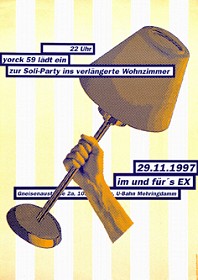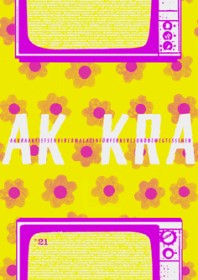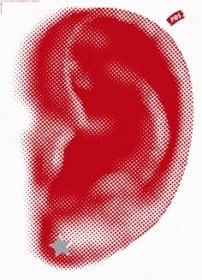
Poster for a party at the bar EX (1998)
"EX" was a collectively run bar, cafe and restaurant in West-Berlin for over 20 years. It was more or less the main meeting point for the large radical leftist scene of the city of Berlin. A place get information about the political events happening, though leaflets, posters and especially from the big charcoal board where all actions, manifestations and solidarity parties were listed and updated daily. The non profit collective a lot of times had “budget problems”, so a lot of solidarity parts were organized to raise money for the EX. In 2001 the EX closed and a different collective, of mainly latin american immigrants is now running the cafe and bar.
The EX was located in the Mehringhof: the Mehringhof is the biggest alternative center in Berlin. A large number of political projects, initiatives, associations, publishers, a bookshop, a bicycle shop, theater, an independent school etc. are based on 5000 square meters of land. The Mehringhof is (after 22 years) still collectively run and owned by the tenants, by the people who use the space. The "lamp-fist" party poster for the EX is playing with one of the most common icons in the leftist politics: the fist – combined with a living room lamp, it becomes an ironic comment on how some of the leftist scenes are settled in subcultural identities.

Ak Kraak (video collective) (2001)
Ak Kraak is a biannual political video magazine and production collective which provides a cultural and content space for political scenes and movements. Ak Kraak grew out of the last big squatting movement in (east) Berlin in the early 90s. At the time the East Berlin government was coming down and the West Berlin officials were not yet in charge of East Berlin, more than 120 houses had been squatted (…). Ak Kraak understood itself as some kind of information distributor – from the movement, for the movement – to confront the diverse cultural and political scenes with each other, to raise discussions and critique, and to build and to deconstruct identities. – the squatting movement in Berlin is now gone (…)
Ak Kraak still produces video films and the legendary magazine (every 6 months a tape with various contributions) on issues like squatting, critical globalization issues, anti-racist activities, anti-fascism, sub- and counter-culture events, demonstrations and action revues from the political movements is published. The magazine is then screened at something like 50 places in Berlin, such as cafes, bars, video cinemas and cultural centers. Distributed throughout german speaking countries is a part of this project - always to create social and collective situations when showing the tape in public places, rather than selling it or broadcasting it via television.
The poster plays with the private and public space as it functions as a wallpaper which is posted on the outside walls of the city houses. – the image of TV and the typography only functions when at least 2 posters are put up: “AK KRA - AK KRA”

Rock fuer Links (Rock for the left) (1997)
The red ear poster was done for a series of anti-fascist concerts which were organized by a local branch of the socialist party (PDS). Since there were 4 concerts but only a budget for one poster – the blank poster with just the read ear was printed and the data for the events were photocopied, then pasted on later. Most likely because the PDS came out of the former ruling party of east Germany, some people wrote on the poster "Stasi" – (the former secret service of the GDR – still spying on us with big red ears?)
This poster – as most of my posters – was fly-posted. Fly-posting is a very common practice in some of Berlin’s neighborhoods. Mainly done by leftist political activists or cultural institutions with a lower budget, fly-posting is always a sign of a communicating city and diversity in public space, like graffiti or other forms of street art. But, as everywhere, these spaces are "battlegrounds" and are becoming fewer and fewer while the city officials are "cleaning up" and more and more areas are getting privatized.
Most of the public visual space is already in the hands of a few, who can afford to speak, who can afford to rent advertisement billboards. In 1999 the senate of Berlin tried to pass a new law against fly-posting, which was aimed not only at the fly-posters themselves, but also at the organizers of the promoted events; even the attempt was made to force house owners to report new posters and grafiti to the city officials. If not they would get a fine. But this attempt was stopped by the property owner lobby.